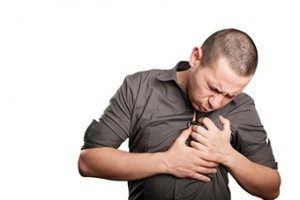 Approximately 10 to 20 out of every 100,000 people around the world are affected by myocarditis each year. Myocarditis is a condition that causes inflammation in the heart muscle, enlarging it and weakening its ability to pump blood. It is most often caused by an infection from a virus, bacteria, fungi, or parasites, as well as some medical treatments and inflammatory conditions.
Approximately 10 to 20 out of every 100,000 people around the world are affected by myocarditis each year. Myocarditis is a condition that causes inflammation in the heart muscle, enlarging it and weakening its ability to pump blood. It is most often caused by an infection from a virus, bacteria, fungi, or parasites, as well as some medical treatments and inflammatory conditions.
Myocarditis can cause a range of different symptoms, and not everyone may experience the same ones. They may include:
- Chest pain
- Heart palpitations
- Shortness of breath
- Lightheadedness
- Abdominal pain
- Leg or foot swelling
- Fainting
Certain serious complications are associated with myocarditis, including arrhythmia, heart failure, lung problems, and even death. However, in most cases, this condition is mild and will go away on its own.
Some people are at greater risk of developing myocarditis than others. People of all ages and any gender can get it, but it is most common in young adults assigned male at birth. A genetic tendency to react poorly to inflammation can also increase your risk, as well as excessive alcohol consumption.
Certain medical conditions may also make you more vulnerable to myocarditis, including diabetes, HIV/AIDS, kidney disease, chest injuries, skin injuries or infections, and eating disorders. Additionally, medical treatments such as dialysis, radiation, a central venous line, and certain heart condition or cancer treatments may also increase your risk.
If you experience severe myocarditis, treatment may involve medication, surgery, or both. Corticosteroids, heart medications, or treatments for underlying conditions that may be causing your myocarditis could help. If these do not provide adequate relief, you may require procedures such as:
- IV medications
- Ventricular assist device (VAD)
- Intra-aortic balloon pump
- Extracorporeal membrane oxygenation (ECMO)
- Heart transplant
If you experience chronic or severe myocarditis, schedule an appointment with a cardiologist at Flushing Hospital’s Ambulatory Care Center by calling (718) 670-5486. If cardiac arrest or acute heart failure occurs, dial 911 immediately.
All content of this newsletter is intended for general information purposes only and is not intended or implied to be a substitute for professional medical advice, diagnosis or treatment. Please consult a medical professional before adopting any of the suggestions on this page. You must never disregard professional medical advice or delay seeking medical treatment based upon any content of this newsletter. PROMPTLY CONSULT YOUR PHYSICIAN OR CALL 911 IF YOU BELIEVE YOU HAVE A MEDICAL EMERGENCY.
